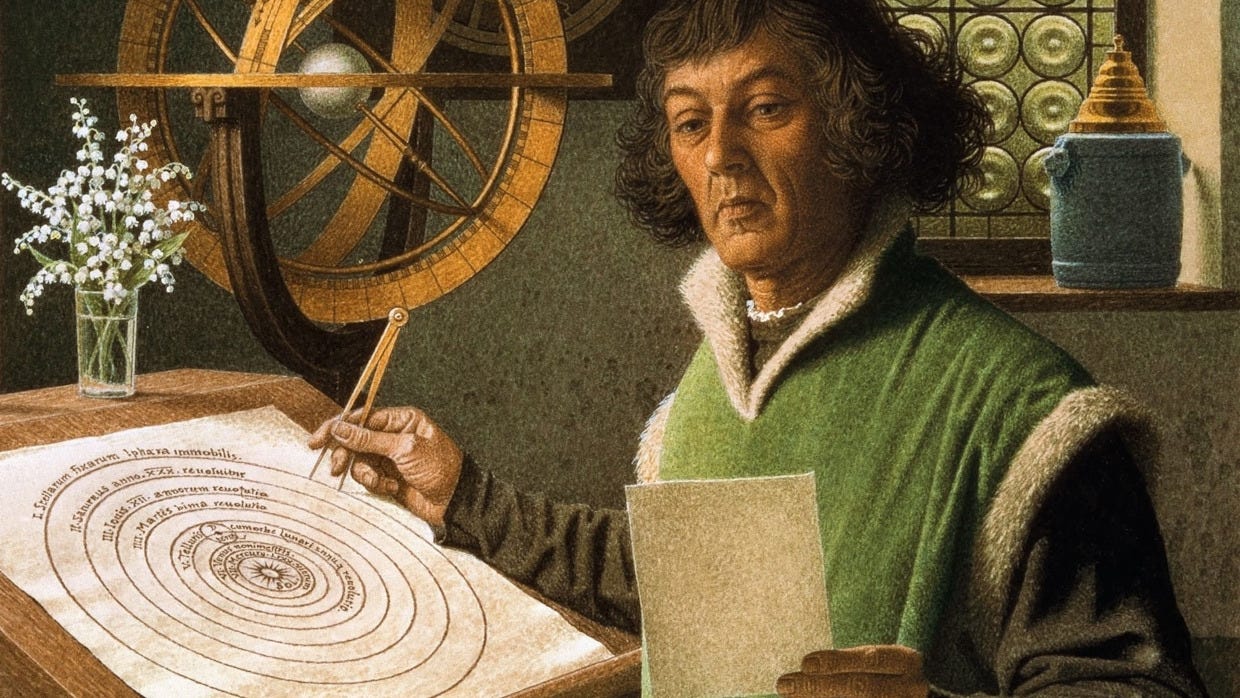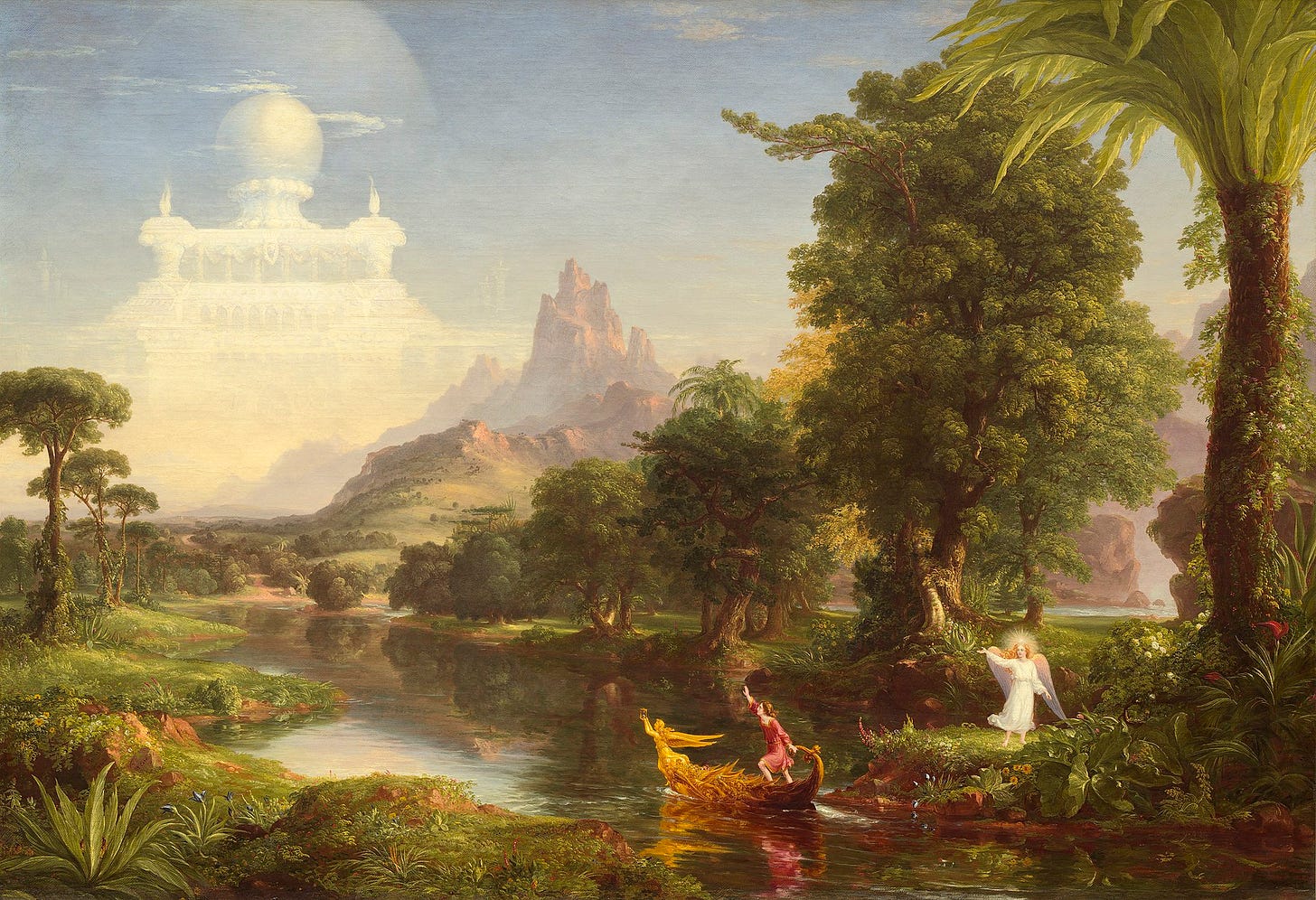UPTM #1 | A Paradigm for the 21st Century: Introducing A Unified Process Theory of Meaning
Uncovering the Heartbeat of Humanity And The Cosmos: A Preliminary Thesis
|| UPTM Table of Contents || Prelude | Part 1: 21st Century Paradigm | Part 2: Nature | Part 3: Man | Part 4: Bible | Part 5: Organic-Computational Theology | Part 6: Transcendental Ideals | Part 7: Re-Imagining Modernity | Full Research PDF
Introduction: A Modern Copernican Revolution to Shift Our Center of Orbit to Humanity
1. The Plight of Modern Man
Our modern era has bore witness to incredible technological marvels that have radically transformed the material conditions of human existence. Yet this outward material progress has outpaced our inward philosophical growth. We stand at risk of becoming what I'm endearingly calling "Apes in Ironman Suits" - erudite in the practical arts of material manipulation, yet lacking in profound wisdom about human nature.
The great truth-seekers of past ages understood that purely utilitarian knowledge is insufficient. If not, we risk living in a land of arid barrenness devoid of meaning and purpose, as depicted by T.S. Eliott's in the poem The Waste Land. Or equally grating, a suffocating blindness to salvation in favor of lulling material comfort as depicted by Aldous Huxley in A Brave New World. To live a truly meaningful life and avoid becoming unmoored by our increasing mastery over nature's forces, we must cultivate an inner richness and grasp of the immutable metaphysical laws underlying the physical world to stay aligned with the hidden forces of nature.
Our goal is to bridge this divide between material might and philosophical maturity in a modern context. As our starting point, we look to question our implicit default assumptions and metaphysical premises, which may inadvertently constrain our view and vision. We cannot be bound by the conceptual blinders of the conventional reductionist, materialist paradigm that currently dominates our 21st century zeitgeist and its subsequent influence into all facets of modern society.
Ilya Prigogine, the Nobel-prize winning complexity scientist, in his reflections on the philosophy of science, laments that modern science has been reduced to "atoms and the void," where our world has been stripped down to mindless matter, leaving us struggling to recognize ourselves in the current intellectual landscape. He speaks of the "anxiety of modern man and the feeling of alienation," where "life, destiny, and free will became manifestations of a shadowy underworld impenetrable to reason."1 We find ourselves in the shadow of Democritus, the original pre-Socratic proponent of "atoms and the void," whose ideas were debunked by Plato and Aristotle thousands of years ago. Calling out to the void from our floating rock of Earth, our Robinson Crusoe island, we search for any signs of life, meaning, and purpose. But what if in fact, life itself - and meaning - here on earth, in our bodies, is at the center of our human and cosmic story?
A fascinating question. With open yet discerning minds, we shall embark on an odyssey of re-integrating modern empirical knowledge within a revived process-based metaphysics and show how these find unifying resonance across natural sciences, computational neuroscience, and mythopoetic works. We will employ the rigorous tools of formal rational analysis and empiricism – not abandoning them entirely in favor of blind faith. By doing so, we will attempt to uncover a beautifully quiet but persistent underlying rhyme and reason beating throughout nature, man, and myth - a theory of organic and creative process - that unites us all in a cosmic symphony.
“But I don't want comfort. I want God, I want poetry, I want real danger, I want freedom, I want goodness, I want sin.” - Aldous Huxley, Brave New World
2. A Guide to Our Intellectual Journey
Our thesis is fundamentally simple: meaning manifests when the pattern of nature and the pattern of man match. To explore this further, our approach will be comprehensive but straightforward: we will first look to better understand (1) Nature then (2) Man and then (3) elucidate these underlying patterns and explore when they match.
We will draw inspiration from the ancient traditions of the Greek philosophers and the Biblical story - while simultaneously remaining grounded in mathematics, complexity science and other modern disciplines. In our synthesis, we will look to stay focused on empiricism and rigor. By experientially (attempting to) ground lofty metaphysical truths in the textures of science and the story of humanity, we may recover a felt sense of the profound interconnectedness of mind and nature.
The scope is vast but the intent of this piece is introductory to paint the high-level architecture of our thesis. More of an intuitive sketch than formal proof. We will then do the appropriate deep dives with the rigor it deserves, coloring in the remaining conceptual mural with more detail.
Our detailed outline is below with headers linking to each respective section:
Formulating a Unified Process-Based Natural Philosophy: We recategorize physics, chemistry, and biology into a simplified 7-stage process theory, evoking the original Platonic and Aristotelian principles to uncover the ancient intuition
Understanding Man via The Free Energy Principle, The Bayesian Brain, And Markov Blankets: We leverage our recent learnings from cutting edge cognitive neuroscience, namely the predictive processing framework and Markov blanket formalisms to bring the full rigor of complexity science & interpret the brain's workings in light of this process philosophy
Uncovering Organic Process Themes in The Biblical Meta-Narrative: We apply this framework to the Bible, the founding canon of Western civilization. In particular, we discern a fascinating overarching and consistent organic process meta-narrative across multiple structural levels - from symbolism to narrative and overarching literary architecture
Organic-Computational Christianity: We then interpret the Biblical narrative through the lens of process & predictive coding to bring a modern and novel complexity-based heuristic account to the story, demonstrating parallels with our brain's own internal working
Revisiting The Transcendental Ideals: We review our definitions of the transcendental ideals by illuminating the meaning-making power of recognizing nature's processes and the reverberating implications of humanity's place within the cosmic order.
On Meaning and Re-Imagining Modernity: We provide our take on Meaning in light of our thesis and discuss what the implications are for a revised and enchanted outlook to chart a way out of the postmodern nihilist slumber that is modernity
We will go into detail in each one of these in subsequent posts over the coming weeks, splitting up the thesis into their respective sections to make for a more digestible read.
If you’d like to go through the entire research in PDF format, the full draft can be found here: Unified Process Theory of Meaning
3. Cultural Implications for Western Civilization
If this preliminary theory - one I'm calling a Unified Process Theory of Meaning - proves coherent, the implications for revitalizing meaning in a disenchanted nihilist postmodern world could be nothing short of enormous. It would be the equivalent of a modern Copernican revolution. Science and Religion could be harmoniously united in a coherent and empirically backed framework, providing a glimpse of what a post-Secular Age future could be like. Ancient mythopoetic & religious works would be re-established as sources of deep wisdom to guide our path towards existential coherence amidst blinding technological might.
We could anchor our complex Western civilization within a stronger and more integrated philosophical foundation, with fragmented modern mindsets rediscovering how to reason from wholes to parts in a meaningfully integrated "Gestalt" once again. A sense of unity could be re-established in a fractured world rife with existential discord, cultivating the profound interconnectedness between Nature, Humanity, and the Myth. Our orbit could shift to humanity - to purpose - with technology as the secondary "ex-bodied" extension.
This "re-enchantment of the world" is not a relapse into premodern credulity but a rational meta-modern realization that our disenchantment is itself a story - a provisional myth ripe for transcendence. By daring to dream the world and ourselves into creative becoming once again, we reclaim our proper role as co-creators of the cosmic dance. This orientation has pragmatic import for our civilization's cultural organs as well - our ethics, politics, education, and cultural storytelling could all be realigned to the hidden harmonies of this process-based vision.
4. And So We Depart
We must note that not everyone will immediately embrace such a sweeping synthesis. Rigorous argumentation for the existence and explanatory power of this framework will be necessary to persuade skeptics. Throughout the exposition, we shall take pains to unpack key concepts slowly, using vivid analogies and examples to evoke their living significance. Formalisms will be deployed judiciously and translated into accessible terms.
Amidst the centrifugal energies of modernity, a countervailing call to centripetal integration is growing. The hunger for a new meta-narrative that binds knowledge and experience back into profound unifying coherence can no longer be ignored. Let us heed the summons and plunge into the quest - exploring, with full sincerity, whether an underlying Order and Beauty can still be found beneath the rubble, fractured surfaces of our world, beckoning us home.
Next Section: UPTM #2 | Formulating a Unified Natural Philosophy
This research is preliminary and we're publishing this in the spirit of building in public. Feedback, open dialogue, and collaboration is very much encouraged! I will most certainly be wrong in places as I have developed these ideas rather independently. If you are exploring similar ideas, please reach out or expect at a DM as I plan to connect with scholars and folks more knowledgeable & experienced then myself to continue to refine & better articulate the thesis. Please also feel free to follow along or get in touch at @tomer_solomon or by subscribing to my Substack!
From Order Out of Chaos by Ilya Prigogine.





